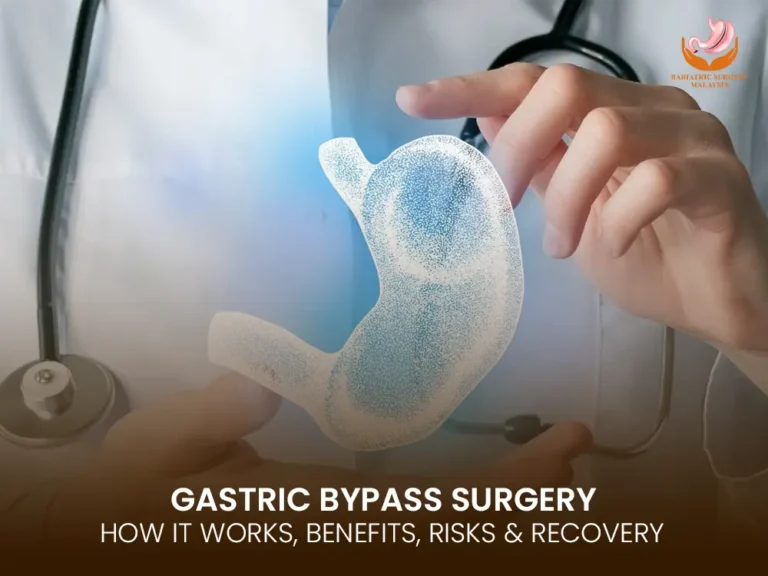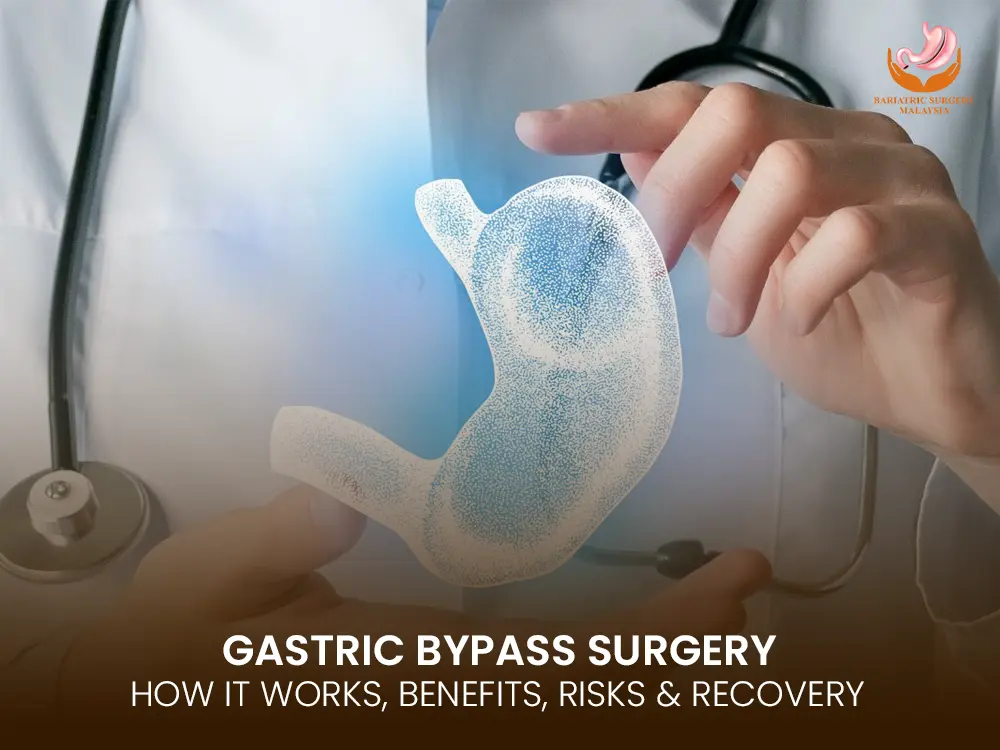Introduction: What Is Gastric Bypass Surgery?
Gastric bypass surgery is a clinically proven bariatric procedure that supports long-term weight loss by altering the digestive system. In Malaysia, gastric bypass is commonly performed by certified bariatric surgeons using minimally invasive laparoscopic techniques. This bariatric surgery is particularly effective for individuals dealing with severe obesity, type 2 diabetes, and metabolic syndrome.
Unlike non-surgical weight loss options, gastric bypass surgery significantly reduces stomach capacity and reroutes the digestive tract to limit calorie absorption. This approach not only promotes rapid weight loss but also contributes to the remission of chronic conditions such as hypertension, high cholesterol, and insulin resistance.
How Gastric Bypass Surgery Works

The standard technique used is the Roux-en-Y gastric bypass. During the procedure, a small pouch is created from the upper stomach. This pouch is then connected to a section of the small intestine, bypassing the rest of the stomach and upper digestive tract. This results in reduced food intake, changes in gut hormones, and improved insulin sensitivity.
In Malaysia, laparoscopic gastric bypass is preferred for its safety, smaller incisions, reduced pain, and quicker recovery. Patients typically experience dramatic weight loss within the first year, supported by a structured dietary plan and follow-up care.
Who Is a Candidate for Gastric Bypass Surgery?

Ideal candidates for gastric bypass surgery meet the following criteria:
A Body Mass Index (BMI) of 37 or higher
A BMI of 32 or higher with related conditions such as type 2 diabetes, sleep apnea, or hypertension
Failure to lose weight through conventional methods such as diet and exercise
All candidates undergo medical screening, psychological assessment, and nutritional counseling before surgery.
Benefits of Gastric Bypass Surgery
Gastric bypass is one of the most effective surgical treatments for morbid obesity and associated metabolic conditions. Key benefits include:
Substantial and sustainable weight loss (typically 60 to 80 percent of excess weight)
High rates of diabetes remission within the first year
Improved heart health through lower blood pressure and cholesterol levels
Reduced joint pain, improved mobility, and better sleep quality
Increased life expectancy and overall well-being
Many patients also report improved self-esteem, social interaction, and mental health following surgery.
Risks and Complications of Gastric Bypass
While gastric bypass is considered safe, especially when performed by experienced bariatric surgeons, patients should be aware of potential complications. These may include:
Dumping syndrome, which causes nausea, diarrhea, or dizziness after meals
Nutritional deficiencies in vitamins B12, D, calcium, and iron
Risk of ulcers, hernias, or infections
Gallstones resulting from rapid weight loss
Long-term success depends on strict adherence to dietary guidelines and consistent medical follow-up.
Gastric Bypass Recovery and Aftercare
Recovery from laparoscopic gastric bypass is typically fast, with most patients resuming light activities within two weeks. A phased diet is followed, starting with liquids and advancing to soft foods, then solids. Lifelong supplementation with vitamins and minerals is essential to prevent deficiencies.
Postoperative care includes regular check-ups, lab tests, support groups, and consultations with a dietitian or psychologist to reinforce lifestyle changes.
Why Choose Malaysia for Gastric Bypass Surgery
Malaysia is a preferred destination for medical travelers due to its high-quality healthcare system, MOH-certified bariatric surgeons, and competitive pricing. Patients benefit from:
Modern hospitals and advanced laparoscopic technology
English-speaking healthcare professionals
Affordable surgery packages without long waiting lists
Personalized care and integrated recovery support
The cost of gastric bypass in Malaysia typically ranges from RM25,000 to RM45,000, depending on the complexity of the case and hospital selection.
FAQs About Gastric Bypass Surgery
What is the difference between gastric bypass and sleeve gastrectomy?
Gastric bypass involves rerouting the digestive tract and reducing stomach size, while sleeve gastrectomy removes a portion of the stomach. Bypass often leads to faster weight loss and more hormonal changes.
Is gastric bypass surgery safe?
Yes, especially when performed by certified bariatric surgeons in accredited facilities. Risks are low, and success rates are high with proper follow-up.
How long is the recovery after gastric bypass?
Patients usually stay in the hospital for 1 to 3 days and can return to normal routines in 2 to 4 weeks, depending on individual health conditions.
Will I need to follow a special diet after surgery?
Yes, a structured post-bariatric diet is critical. It begins with clear liquids and gradually reintroduces solid foods over several weeks.
Is gastric bypass surgery permanent?
Yes. It is considered a permanent surgical intervention. Long-term success relies on consistent dietary management and medical monitoring.



